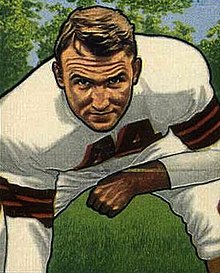 Rymkus on a 1950 football card | |||||||||
| No. 12, 44 | |||||||||
|---|---|---|---|---|---|---|---|---|---|
| Position: | Tackle | ||||||||
| Personal information | |||||||||
| Born: | November 6, 1919 Royalton, Illinois, U.S. | ||||||||
| Died: | October 31, 1998 (aged 78) Houston, Texas, U.S. | ||||||||
| Height: | 6 ft 4 in (1.93 m) | ||||||||
| Weight: | 231 lb (105 kg) | ||||||||
| Career information | |||||||||
| High school: | Tilden (Chicago, Illinois) | ||||||||
| College: | Notre Dame | ||||||||
| NFL draft: | 1943 / round: 7 / pick: 60 | ||||||||
| Career history | |||||||||
| As a player: | |||||||||
| As a coach: | |||||||||
| |||||||||
| Career highlights and awards | |||||||||
As player:
As coach:
| |||||||||
| Career NFL statistics | |||||||||
| |||||||||
| Record at Pro Football Reference | |||||||||
Louis Joseph "the Battler" Rymkus (November 6, 1919 – October 31, 1998) was an American football player and coach in the All-America Football Conference (AAFC), National Football League (NFL) and American Football League (AFL). Playing as a tackle for the Cleveland Browns in the AAFC and NFL in the late 1940s and early 1950s, Rymkus provided pass protection for quarterback Otto Graham as the team won five league championships. Following his playing career, Rymkus took a number of assistant coaching jobs before serving as the first head coach of the AFL's Houston Oilers in 1960. The team won the league's first championship, but Rymkus was fired by Oilers owner Bud Adams after a slow start in 1961.
Rymkus was born in Royalton, Illinois and grew up in Chicago. He was a star lineman in high school and won a football scholarship to attend the University of Notre Dame. At Notre Dame, he played on a 1941 team that went undefeated under head coach Frank Leahy. Rymkus was drafted by the NFL's Washington Redskins in 1943 and played one season for the team before joining the U.S. Marines during World War II. Following two years in the service, he signed with the Browns, where he spent the remainder of his playing career. Paul Brown, the Browns' first coach, called Rymkus "the best pass protector I've ever seen".[1] His blocking was used by coaches to demonstrate proper form.
After Rymkus's brief stint coaching the Oilers, he held numerous football jobs, including as the coach of a high school team in Louisiana and an assistant with the Detroit Lions. Rymkus was a finalist for induction into the Pro Football Hall of Fame in 1988 but was not elected. In 2005, he was named to the Professional Football Researchers Association Hall of Very Good in the association's third HOVG class.[2]
He died of a stroke in Houston, Texas, where he lived for most of his later life.
- ^ Piascik 2007, p. 241.
- ^ "Hall of Very Good". Archived from the original on October 5, 2016. Retrieved July 14, 2016.